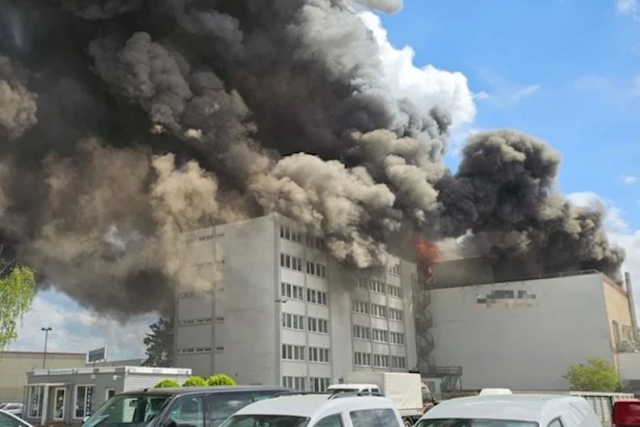
Norway has established Camp Jomsborg, one of the largest Norwegian military camps abroad, in the forests of southeastern Poland to train Ukrainian soldiers with Norwegian instructors, NRK reported on 15 September.
The camp, built from scratch starting this summer, currently houses hundreds of Norwegian military personnel and has begun receiving its first groups of Ukrainian trainees – experienced combat veterans from the front lines.
“They are at war. There are drones and artillery strikes. There is close combat and firefights daily. We try to recreate that, so we follow the principle ‘train as you fight,'” a Norwegian Defense instructor told NRK.
The training focuses on realistic combat simulations, with the first module addressing stress management in combat conditions. During one exercise observed by NRK, a camouflaged soldier crouched against a pine tree with wide-open eyes while Ukrainian soldiers around him slapped his cheeks, struggling to make contact. White smoke drifted between the trees as explosions echoed through the forest.
“We must prepare soldiers as well as possible so they survive at the front,” Ukrainian brigade instructor “Darius” told NRK.
Darius, now 23, was studying international politics in Kyiv when Russia launched its full-scale invasion three and a half years ago. He has since fought in Zaporizhzhia, Bakhmut – nicknamed “the meat grinder” before it fell in spring 2023 – and currently serves at the front in Kharkiv.
The camp is part of Operation Legio, led by Norway and including all Nordic countries, the Baltic states, and Poland. The operation encompasses both weapons deliveries and soldier training.
According to Brigadier Atle Molde, chief of Operation Legio, this marks the first time Norway has led an international operation abroad.
The exact location of Camp Jomsborg remains classified, but thousands of pine trees have been felled to make room for tents and shooting ranges. Construction equipment operates continuously between tents and containers across the sprawling site.
Ukrainian instructors help design the training programs based on current battlefield conditions. “We contribute by being a testing ground where we can test all possible weapons systems,” Darius explained about the Ukrainian battlefield.
Logistics presents one of the biggest challenges, according to Darius. Equipment and weapons must be carried on foot for many kilometers, leading Ukrainians to experiment with unmanned vehicles for supply delivery.
“Soldiers must stay at their positions for two to three months,” he said. “Getting them out is extremely dangerous. Most of our losses occur when people are traveling to or from the front line.”
The training program includes tactics, trench warfare, and extensive drone operations for both surveillance and attacks. “We need a safe place to train where Russian missiles and attack drones cannot reach us,” Darius noted.
Knowledge exchange flows both ways. Ukrainian instructors provide Norwegian personnel with insights into front-line challenges and emerging battlefield trends.
The Norwegian stress management instructor described the impact of working with Ukrainian soldiers: “You notice there’s a bit more seriousness in the room when you’re teaching soldiers who come straight from the front and have been in sharp combat actions just days before arriving here. You know that what you’re teaching has a direct impact on those guys when they return to battle.”
Camp capacity will vary depending on training type – fewer for specialized courses, more for basic military education. When completed, the facility will accommodate several hundred Ukrainian soldiers.
Recent weeks have been marked by high-level politics, including conversations between US President Donald Trump and Russian President Vladimir Putin, and summits in China where Putin and North Korean leader Kim Jong-un were invited. European leaders have emphasized strengthening cooperation in supporting Ukraine, with European support now at record levels.
Molde acknowledged Russian interest in monitoring camp activities but dismissed immediate attack threats: “A direct attack on a NATO country where we are now is a very big red line to cross. So I don’t consider that a very big threat.”
Following NRK’s visit, several drones have entered Polish and Romanian airspace on multiple occasions. Russia was accused of deliberately sending drones into Polish airspace, which the country denied. According to the Defense Ministry, these incidents have not affected Camp Jomsborg activities.
Darius expressed concern about potential erosion of allied support, noting shortages of ammunition, equipment, and soldiers. “I hope for good news, but our mission is to do the job ourselves.”


